|
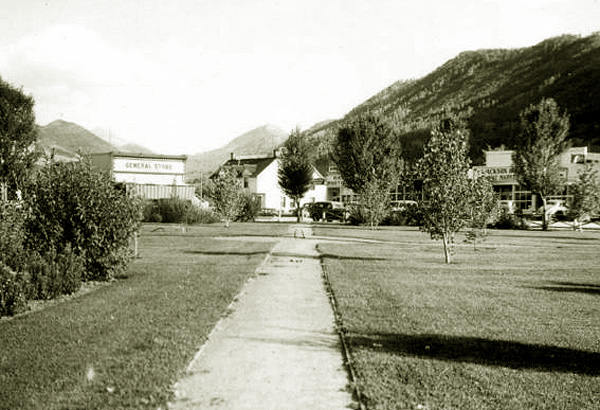
The Square looking toward the Crabtree Hotel, approx. 1941.
The southeast corner of Center and Broadway is now referred to as the Crabtree Hotel. The hotel was originally
the hotel was initially known as the Reed Hotel and was purchased in 1908 by "Ma" Reed from Dr. Luther T. Palmer who initially operated
the facility as a four room sanitorium for consumptives.
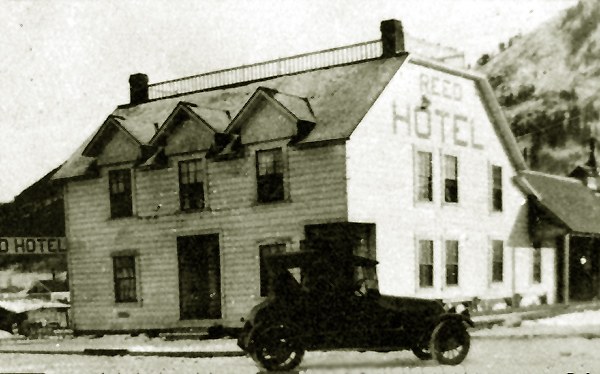
Reed Hotel, undated
Ma continued to operate the hotel until
October 5, 1917, when Ma apparently unexpectedly
departed leaving unpaid debts including $10,000 owed to the Jackson State Bank. Operation of the hotel was then taken over by Rose and Henry
Crabtree. Roselyn Meyer Crabtree ((1883-1978) and Henry E. Crabtree (1881-1958) originally came from
Indianola, Red willow County, Nebraska. Rose was employed by Ma at the hotel and Henry worked for Charles Fox who was the leading building contractor in
Jackson. Fox was responsible for the construction of the Jackson Hardware, the Chapel of the Transfiguration at Moose, some of the
buildings at the Bar B C and at the J Y. Most importantly, Fox constructed much of the Flat Creek Ranch north of Jackson. Later Henry became a contractor in his own right. Both Henry and Rose Crabtree
achieved national fame as a result of articles written by Cissy Patterson and the election of the first all woman
municipal government in the United States. Rose defeated her own husband Henry who at the time was the sitting mayor 50 votes to 31. See below.
The hotel for several years continued to be known by its former name before being renamed.
After several years, Ma Reed returned to Jackson and ran a dining room across the street.
She still had trouble paying her bills. Bill Mercill would, as an example, not extend credit to her after she ran up a large unpaid
tab. In 1934, her dining room was sold in order to pay her unpaid debts. Ma died in 1938. Ma was noted for the
use of salty language, tall tales, and a gruff manner toward her customers. She allegedly carried a pair of brass knuckles in her
apron which she would rap on the head of customers with which she disagreed. One of the tall tales she repeated is that she hid out
Butch Cassidy in the hotel. Butch, however, at the time was living in Argentina and Bolivia.
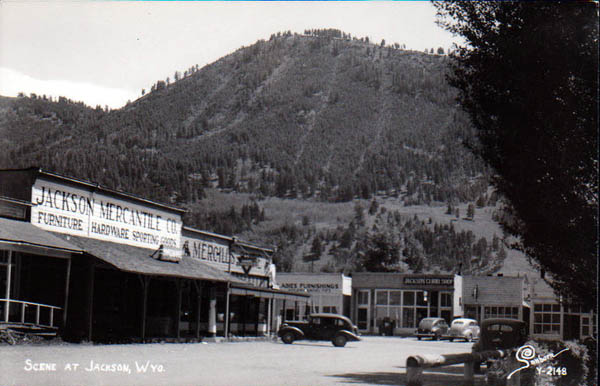
End of Center Stree, looking south. Photo by William P. Sanborn, 1940.
Rose was a good friend of Eleanor"Cissy" Patterson, the granddaughter of the founder of the Chicago Tribune and a member of the
McCormick family of reaper, tractor, and newspaper fame. Cissy, at the time because of her wealth and connections with the newspaper business, was reputed to be
the most powerful woman in America. Cissy owned the Flat Creek Ranch north of Jackson and when she was in town would stay at the Crabtree Hotel. Rose's incluence on the future
growth of the Jackson area is perhaps understated. Cissy made many of the arrangements for the construction of the building
of the Flat Creek property by Charles Fox using Rose as an intermediary. The Flat Creek Ranch has been credited for being significant in bringing Jackson to the attention of the hoi polloi of
America. As summed up in the Nomination of the Flat Creek Ranch to the National Register, quoting National Park Service hisorian John Dougherty:
Bar BC dudes Eleanor Patterson, 'the Countess of Flat Creek,' and Lambert Cadwalader, bought their own ranches, beginning the
trend of affluent people buying ranches to realize their dream of owning a western ranch."
Writer's note: Lambert Cadwalader (1883-1964) was a member of the elite of Philadelphia society. The Cadwaladers were active members of
Pennsylvania and New Jersey politics. Lambert Cadwalader (Princton Class of 1905) in addition to
running a ranch in Teton, Wyoming, raised apples in Washinton State and later served as a member of the
Pennsylvania Assembly and the Pennsylvania Historical and Museum Commission. the family lineage allegedly goes back to
both Rhodri ap Merfyn (Rhodri the Great), ruler of a large part of modern Wales in the 9th Century and David I, King of Scotland.
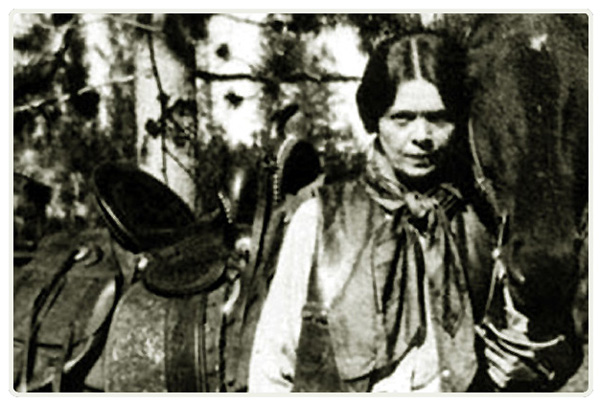
Cissy Patterson, undated.
Cissy received much
notariety as a result of her marriage to an impoverished Russian cavalry officer Count Josef Gizycki. She had met the count at a ball at the
Court of the Emperor Franz Joseph. Her uncle, Robert McCormick, was the American ambasador to the Austro-Hungarian Empire. The marriage was not
one made in Heaven. They had one child a daughter, Felicia. Adrian Dannatt wrote with all the "understatement and discretion" which our British
cousins use in matters requiring delicacy:
No sooner did she reach his dilapidated, freezing "castle" in Narvosielica than she realized her mistake; he told her bluntly that they had sex only to make
a child and so that he could gain her $30,000 a year income. In 1905 that child, Felicia, was born whilst the Count was away whoring.
Determined to escape this remote icy wasteland, Cissy enlisted her serfs and fled by sleigh to the Russian border. The Count pursued them to LOndon and -- disquised in
motoring goggles and fur coat -- kidnapped Felicia from a park. The Independent, London, May 18, 1999.
The Count held the child for ransom in an Austrian convent. Only a letter from President Taft to the Tsar and an order from the
Tsar caused the child to be released. At one time, Cissy was a good friend of Alice Roosevelt Longworth. The friendship broke up when
Cissy and Nicholas Longworth were allegedl found on the floor of a bathroom as to which they apparently forgot to lock the door.
Cissy invited Rose to Washington. Rose indicated that she would like to meet President Coolidge. When the White House was being renovated in 1927, the government rented Cissy's house on
Dupont Circle as a substitute White House for President Coolidge's use. The meeting was arranged. Cissy's last visit
to Jackson was in 1934. Return visits to the Flat Creek Ranch were repeatedly delayed with various
excuses. In 1939, she wrote Rose that she would have come but for her age, an old grizzly bear, the mosquitoes and if had not the
"whole of Jackson Hole hadn't slept in my bed for the past several years." In 1948, Cissy called Rose about plans for a last visit.
Cissy died on July 24, 1948, before the visit could be made.
The Flat Creek ranch is now on the National Register. Initially the ranch lacked inside plumbing.
The privy is regarded as "non-contributing" to the historical significance of the ranch.
Felicia, estranged from her mother, died in a Laramie retirement home on February 26, 1999.
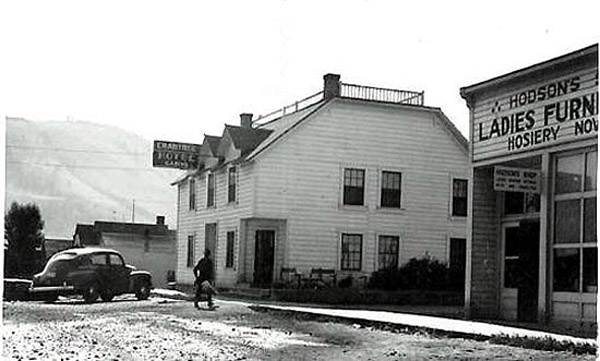
Crabtree Hotel, approx. 1940.
To the right of the hotel is Hodson's Ladies Furnishings owned by Helen Butterfield Hodson (1915-1965) and Kenneth Joe Hodson (1913-1995).
It serves as a reminder that the photo was taken when the winds of war were blowing across Europe and would in a year overtake the
United States. Kenneth Hodson was a graduate of the Univeristy of Kansas and received his law degree there in 1937. He briefly practiced law
in Jackson before being called up as a reservce officer in 1941. Ultimately he rose to the position of Major General and was the
first chief Justice of the Army Court of Military Review. He was the author of the proceedural chapters of the 1951 Manual for Courts-Martial. the American
Bar Association Government and Public Section has designated an annual award after him.
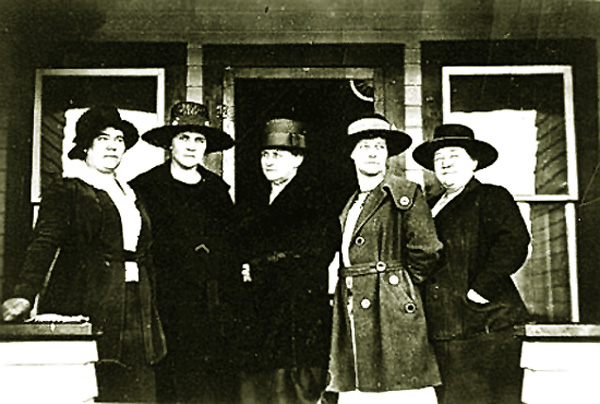
Jackson Town Council, 1921. L to R: Mae Deloney, Rose
Crabtree, Mayor Grace Miller, Faustina Haight, and Genevieve Van Vleck.
Mae Deloney was the wife of State Representative William Deloney, Sr. William Deloney was the son of grocer Charles Deloney. Wiliam was a merchant in his own
right. Other women in the town goverment included Pearl Williams, town marshal;
Edna Huff, health officer; Marta Winger, town clerk; and Viola Lumbeck, treasurer. Within two months of taking office
the new town council increased the amount in the town treasury from $200.00 to $2,000.00. In 1921, The women holding one-year seats were re-elected.
During their terms of office the women improved the drainage, made the cemetery respectable, and improved the water system.
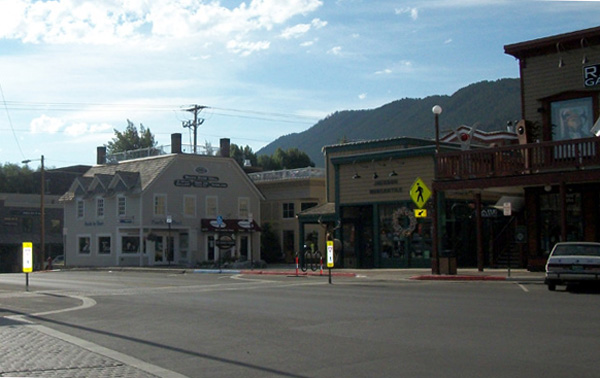
Crabtree Corner as viewed from southeast corner of the Square. Photo by
Geoff Dobson, 2013.
As indicated in the above photo, the original Crabtree Hotel is gone, replaced by a scaled down version in the style of the
hotel. As of 2013, the building houses a restaurant, art gallery, and a confectionary and ice cream parlor.
The Crabtrees are interred in the Indianola Cemetery.
Next Page: Jackson continued.
|